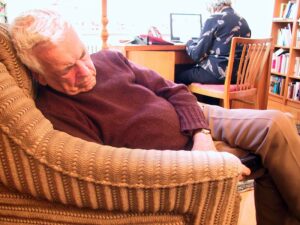By David Wilkening
Contributing Writer

can help with that and other health issues.
Photo/Dan Iggers (CC BY-NC-SA 4.0)
REGION – Going to sleep sounds simple. But it’s not if you’ve ever had insomnia. But that’s only one reason why growing concerns over mental and physical health have escalated in recent years, ballooning the sleep economy to emerge today as a multibillion-dollar pillar of the U.S. wellness market.
No wonder. You’ve already heard all the promised health benefits of a good night’s sleep.
Half the population has sleep issues
But upwards of 50 percent of Americans report some experiences with sleeplessness. And it may not surprise you that people over the age of 60 are the age group with the highest reported levels of insomnia.
“Although sleeping in a bed is the norm for most of us, it’s just not possible for some people,” wrote Scott Grant on the website grayingwithgrace.com. “Whether it is because they are elderly, have back pain, or suffer from a condition such as sleep apnea, there are many people who prefer to sleep in recliner chairs.”
“Sleeping is not a luxury. It’s a necessity for optional functioning,” said Dr. James O’Brien, medical director of the Boston Sleep Care Center in Waltham.
So if you’re an ordinary sleeper who goes to bed nightly, you might wonder about that minority who sleep in some kind of comfortable or “sleeping” chair. Does that get you the recommended eight hours of restful sleep?
Apparently so.
Chair sleep can alleviate some diseases
“Back pain is common among older adults, and many find it more comforting to sleep in a more upright position. This is particularly true of people suffering from lumbar spinal stenosis or osteoarthritis,” said Christian Worstell, a writer who specializes in health and insurance issues.
He added: “Sleeping in a chair can also alleviate sleep apnea, because the tongue is less prone to sliding backward and blocking the windpipe when in an upright position. COPD is another respiratory condition for which chair sleeping can help as an upright position can keep mucus and coughing contained.”
COPD (Chronic Obstructive Pulmonary Disease), is a disease caused by damage to the lungs, which makes it hard to breathe. Often, COPD is a result of many years of smoking, which irritates the airways and destroys the fibers within the lungs.
Sleeping in a chair can also help with heartburn and acid reflux as gravity will keep stomach acid from reaching the esophagus when seated upright, Worstell added. But there’s more. “Sleeping with your head elevated, such as you would in a chair, can also help suppress vertigo and those who suffer from Meniere’s Disease.”
Worstell is well-known in the insurance industry for the thousands of educational articles he’s written, helping Americans better understand their health insurance and Medicare coverage. His writing work as a Medicare expert has appeared in several top-tier and trade news outlets including Forbes, MarketWatch, WebMD and Yahoo! Finance.
As it turns out, sleeping in a normal bed is probably best for most people. But there are exceptions, and cases when you might consider the often-advertised “sleep chairs.”
The website Healthline says our ancestors’ long-standing tradition of sleeping in a bed continues for most of us but that the relatively new recliner rest method is safe. And often offers health benefits.
Why opt for a chair?
Another website, Elder Guru, also found many reasons to possibly opt for “sleep chairs.” They included alleviation of back pain, and a tendency to help pain during sleep after surgery― particularly after often-performed shoulder surgery for older individuals. “As we get older, the need for shoulder surgery can increase. The post-op period can be painful and make proper sleep even more difficult. Doctors highly recommend using a recliner for sleeping for several weeks post-surgery to prevent any muscle strain from occurring,” the site said.
“As a matter of fact, doctors do not recommend sleeping on one’s back or side following shoulder surgery. The horizontal sleeping position can easily exacerbate post-surgery problems. A recliner for sleeping is just what the doctor ordered,” it continued.
Is a sleep recliner for you? “Especially for the elderly, sleeping in a recliner can make bedtime much more comfortable. It might even allow them to sleep better and more deeply. “ concluded Elder Guru, even if they don’t have health problems. “Some might also prefer it simply because they think it’s more comfortable than a bed.”
It also relieves you of one more daily chore: making your bed.
RELATED CONTENT:
Sleep loss puts family caregivers at risk for their own health problems (fiftyplusadvocate.com)
Sleep problems in individuals diagnosed with Alzheimer’s disease (fiftyplusadvocate.com)












